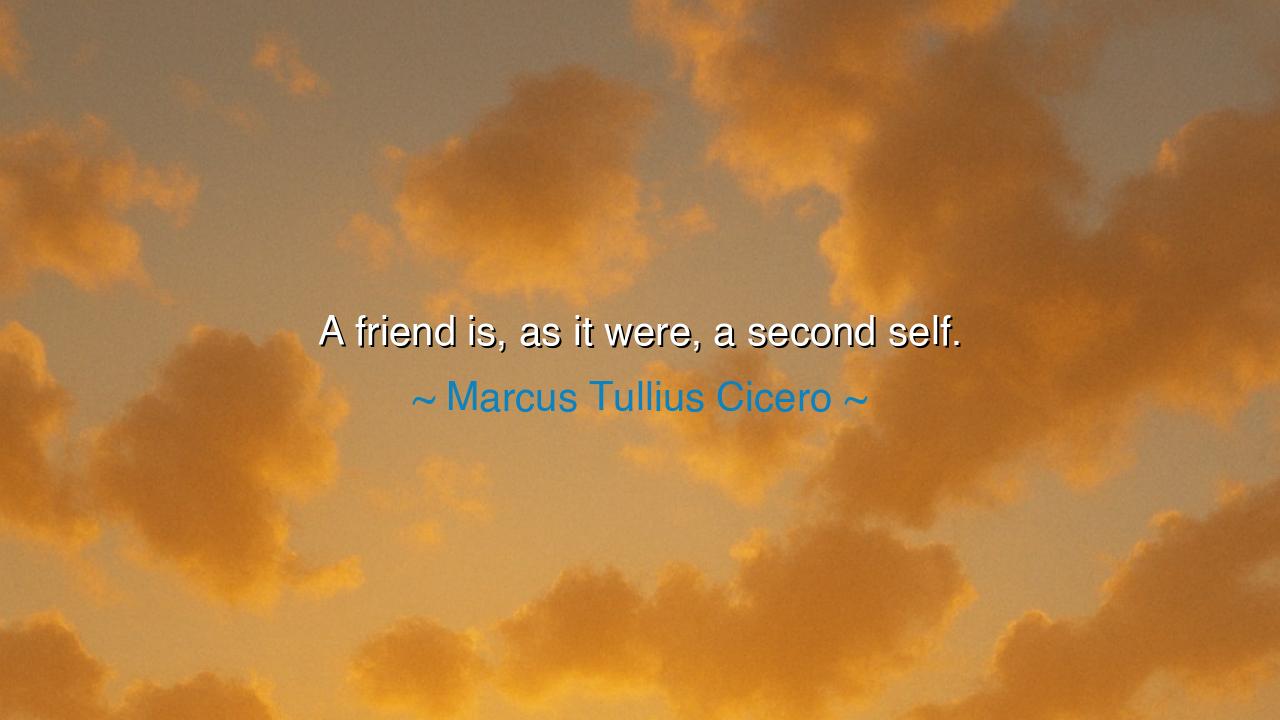
A friend is, as it were, a second self.






"A friend is, as it were, a second self." Thus spoke Marcus Tullius Cicero, the great Roman statesman, philosopher, and orator, whose wisdom still echoes through the centuries. In these few immortal words, Cicero reveals the profound essence of friendship — that in its truest form, it is not merely an alliance or affection between two souls, but a sacred mirroring of the self. A friend, he teaches, is another being in whom one’s spirit finds reflection; a companion whose joy becomes one’s joy, whose pain becomes one’s pain, and whose virtue strengthens one’s own. To have such a friend is to be twice alive, for one’s soul lives both within and beyond oneself.
Cicero’s thought springs from the philosophy of the ancients, who believed that friendship was not a matter of convenience, but of virtue. In his famous treatise Laelius de Amicitia (On Friendship), written after the death of his beloved friend Scipio Aemilianus, Cicero sought to capture the eternal nature of true companionship. He wrote not as a politician or rhetorician, but as a man mourning his “second self.” Through his grief, he discovered that friendship is the highest bond between humans — one based not on need, but on mutual goodness. For when two virtuous souls unite, each becomes an extension of the other, joined by a trust so deep that there is no “mine” or “thine,” but only “ours.”
This idea — that a friend is a second self — is not mere poetry, but a truth rooted in moral philosophy. The ancients saw the self not as isolated, but as part of a greater harmony. Just as the body is incomplete without the heart, so the soul is incomplete without the companionship of one who understands it. A friend allows us to see ourselves from without — to recognize our strengths, confront our flaws, and grow in wisdom. Thus, friendship is not only comfort, but education; not only joy, but transformation. It teaches us to love not through possession, but through reflection.
Consider the friendship of David and Jonathan in the ancient scriptures. Their bond, born in youth and tested in battle and betrayal, transcended fear, envy, and ambition. Jonathan, though heir to a throne that David would one day claim, loved him as his own soul. When David was hunted, Jonathan risked his life to protect him, saying, “Whatever your soul desires, I will do it for you.” This is the living truth of Cicero’s words — that a friend is not separate from the self, but a mirror of its noblest part. When Jonathan died, David’s lament was not merely grief for another man, but mourning for a part of his own soul that had perished.
Cicero’s age — the late Republic — was one of corruption and ambition, when loyalty was often bought and honor easily sold. Yet amid that decay, Cicero held steadfast to the belief that friendship founded on virtue could withstand all trials. His words remind us that true friendship is not born in flattery or convenience, but in shared values — in mutual striving toward the good. He wrote, “Friendship can only exist between good men; for the base cannot be friends.” The wicked, he argued, cannot be a “second self” to anyone, for they do not even possess harmony within themselves. But the virtuous man, steady and sincere, draws to himself another of like spirit, and in that union both are ennobled.
When we ponder Cicero’s wisdom in our own age, we find it no less true. In a world that prizes appearance over essence, connection over depth, his words call us back to the sacredness of loyalty, trust, and understanding. The friend who is a “second self” is not one who flatters us, but one who reminds us who we truly are — who holds a mirror to our soul when we forget our own reflection. Such a friend will speak truth even when it wounds, will rejoice in our success without envy, and will stand firm in the storm, unshaken by time or distance.
Lesson: To find a friend who is a “second self” is among the highest gifts of life — but to be such a friend is a higher calling still. For friendship is not given by chance; it is forged by character, tempered by trials, and kept alive by virtue.
Practical action: Seek not many friends, but true friends. Be to them as you would wish them to be to you — honest, loyal, and compassionate. Celebrate their triumphs as your own, and forgive their faults as you forgive yourself. Look upon your friend as another self — one whose life and happiness are bound to yours. For as Cicero teaches, the man who has found such a companion has doubled his soul, and in the mirror of friendship, he beholds the face of eternity.






AAdministratorAdministrator
Welcome, honored guests. Please leave a comment, we will respond soon